Cascadia has shown itself to be an evocative name, conjuring up visions of a beautiful green land. The lure of this name responds to a genuine thirst for a home here, for a name and way of life authentically grounded in the life of the place itself.
This movement is a spontaneous emergence arising from the people of the place, a true ecocultural development. It is gratifying to see so many people calling themselves Cascadian and speaking of things Cascadian. Hundreds of organizations and businesses of all types have also come to invoke the name.
Some have adopted Cascadia as a way to honor the place we call home, while others use the name for commercial gain or political advantage. Its time to look more deeply into the nature and meaning of the name Cascadia, and learn the terms of respectful address.
1. WHY CASCADIA?
As a land of falling waters, Cascadia names what it does. And what it does is flow in a thousand different streams off a thousand blue hills, white-water streaming down the green flanks of the Pacific slope in a thousand different ways.
Water is the voice of this place, sets the land to singing, the voice that calls life into the place, and invites the people to dwell. Cascades are the mountains breaking into song.
In this white-water streaming, Cascadia describes itself evocatively in the dynamism of its own expressive action. It says what it does, does what it says. You can hear this rhythmically falling flow in the very shape and sound of the word itself, “Cas-cad-i-a”!
It’s the Waters!
Some people think thatCascadia is named after the Cascade Mountain Range of Western Oregon and Washington. Surely one can feel it on the slopes of the Cascade Mountains, streaming white ribbons all around. And this area stands forth proudly in our regional memory as the old heart of Cascadia in the 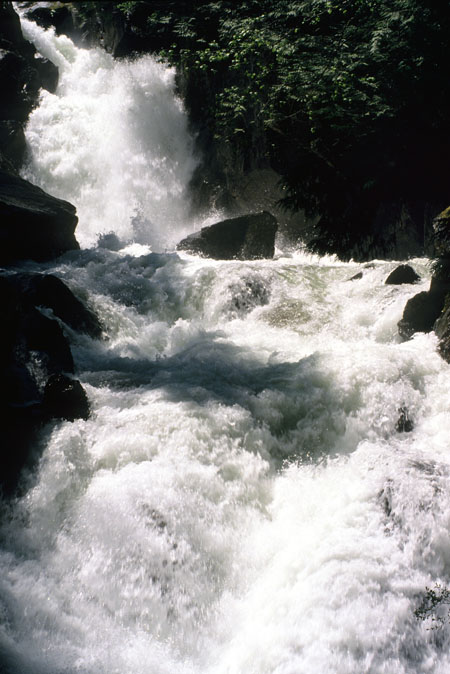 densely populated Willamette Valley and Salish Sea (Puget Sound & Straitof Georgia). densely populated Willamette Valley and Salish Sea (Puget Sound & Straitof Georgia).
But, remember, this old center is not by any stretch of imagination the whole region. For the Cascade Range itself stretches only from northern California to southern British Columbia, certainly not the whole run of the region to southeast Alaska. And, beautiful though they may be, the Cascades are not the only mountains ranging over east to the continental divide which stream white-water. Indeed, there are a hundred more mountain ranges in the region which cascade.
Remember, too, that the Cascade Range was itself named after the falling waters in the Columbia Gorge by the “Great Cascades” of the Columbia River. In terms of naming, the cascades came before the mountains. The latter were first known as “The Mountains by the Cascades,” later shortened to the “Cascade Range.” Thus, the mountains are named after the waters, not the other way round. It’s the waters which give the region its name!
Why Cascadia? Why Not Another Name?
Consider: there have been many different names bestowed on our region over time: New Spain, New Caledonia, New Archangel, New Georgia, the Columbia Department, the Oregon Territory, the Northwest, the Pacific Slope, Ecotopia, the New Pacific, Ecolopolis, and the list goes on.
Note that each of these appellations is a construction—a word or phrase fashioned by the powers that be (or would be), and imposed on the land to take control over it, to impose a “territory” or “ideology” or “brand” on the place itself.
Such attempts conceal a kind of “clearance strategy” declaring the land void, nulla terris or empty space, a mere container that can then be filled up from the outside with their own special interests. Indeed, these and other colonial names are “territorial branding strategies” for taking over a new and distant land—naming as a way of claiming for possession and control.
Why couldn’t our region be called something like these words? Doubtless our region will be called many different names in the future as in the past, as power shifts among contending interests. But none of these names emerge from the land itself. None of them are true to the spirit of the place.
But what about the Northwest as a name?
What’s In a Name—the Northwest?
“Where are you from?” she asks. “From the Northwest,” he replies automatically, without thinking. Then she shoots back, “Northwest of what?”
Her point is well taken: Northwest is a direction, not a place. Recall that there have been many different “North wests” in our histories—which one do you mean?
There was the old “Northwest Territory” in the trans-Appalachian American borderlands north of the Ohio and east of the Mississippi Rivers (later the states of Ohio, Indiana, and the upper mid-West), memorialized, for instance, in the name of “Northwestern University” near Chicago. Do you mean that old “Great Northwest,” or perhaps the later “trans-Mississippi Northwest”?
Then there was the Canadian old “Northwest” beyond Ontario (which later became the provinces of Manitoba and Saskatchewan); do you mean that one, or perhaps Canada’s “Northwest Territories” in the arctic?
Over and over again, “North west” appears as a frontier designation. “Northwest” appears as a succession of ghosts on an ever-receding borderland, composed of equal parts hope and fear of the unknown. “Northwest” is a direction, a vector into terra incognita—beyond the known and inhabited world of the time.
But no, we don’t mean any of those older “North wests” when we respond to her question. When we say, “We’re from the Northwest,” we conjure up instead a dream image of the lush and beautiful “American Northwest” on the Pacific slope. That’s why it’s called “The Pacific Northwest.”
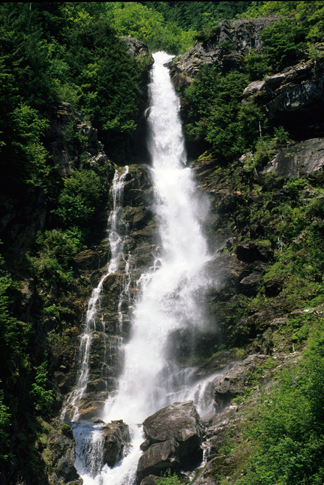 But the term has its own history expressed in shifts in phrasing from “north west” to “North west” to “North West,” and then on to the “Pacific North west,” the “Pacific Northwest,” and finally, “The Pacific Northwest.” This curiouslinguistic evolution describes how a direction becomes a name. But the term has its own history expressed in shifts in phrasing from “north west” to “North west” to “North West,” and then on to the “Pacific North west,” the “Pacific Northwest,” and finally, “The Pacific Northwest.” This curiouslinguistic evolution describes how a direction becomes a name.
Even today, the relative meaning of “Northwest” as a direction depends upon one’s standpoint. Consider, for instance, that “the Northwest” of British Columbia is adjacent to “the Southeast panhandle” of Alaska. What this strange juxtaposition means is that “NW” and “SE”refer here to the same place! (This double identity of NW/SE is further masked by the habit of American and Canadian governments of simply leaving off the map the other guy’s territory right next door!)
And while the name “British Columbia” (descendant of the Hudson’s Bay Company which first established government there) prevailed north of the 49th parallel, the panoply of colonial and commemorative names for the region began to disappear from the map in the American sector south of the border.
In the late nineteenth century, one name began to emerge as the “handle” for the whole region—namely, “The Pacific Northwest.” This moniker was pushed by the railroads who received enormous “land grants” from the U.S. Congress, and had to dispose of the land. “The Pacific Northwest” was part of an ad-campaign by the railroads to sell the region as “a salubrious place to settle.” The railroads’ real-estate scheme was designed to entice settlers and gain customers.
Just as explorers from the sea bestowed commemorative names (“New Georgia, New Caledonia”) expressing their national loyalties, and just as the over-land fur-trading cartels, such as the old “North West Company” (which merged with the Hudson Bay Company in 1821), established the “Columbia Department,” so, too, in the later nineteenth century it was the railroads who constructed a regional identity as part of a real-estate promotion scheme.
In either case, whether Canadian or American, political interests of the imperial powers and mercantile interests of the great multi-national corporations of the era bestowed their own names and boundaries on the land. Distant powers, whose political and economic interests often became con-fused, constructed the first territorial identities for our region.
And yet, you wonder: How can we come to know ourselves, if all we have left are the mad broken dreams of the imperial powers to know ourselves by? How to become a people in the place, if the land has no name of its own?
The basic problem in using familiar terminology such as “The Pacific Northwest,” is that it describes a vector of national imagination more than a real place. Always the center lies elsewhere, and we find ourselves on the far, forgotten periphery. As a regional identifier, you might as well say, “I’m from the Northwind,” and be as substantial.
No, “NW” remains essentially a direction with an arrow shot through it forever flying on that same old arc around the globe, until it sails off into outer space.
Indeed, “Northwestern-er” has always meant “being toward” some other place beyond the margin, and, therefore, never really being at home anyplace. But if we have no real address—no name of our own—residing merely in a direction--a chronic tendency--we can never find a true dwelling place.
I don’t want to ride that arrow anymore. I want to stay here, I like it here. I was born here, my family also, and we shall live our lives, and be buried here, too. This is our home place in every sense of the word, not a stopping over point to somewhere else.
We need, finally, to free ourselves of that old American dis-ease of always being “on the road” to somewhere else, beyond the beyond. For the restlessness, insatiability, and anxiety, involved in such an endless movement toward an infinite horizon exhausts people and the land, is inherently destructive and self-destructive.
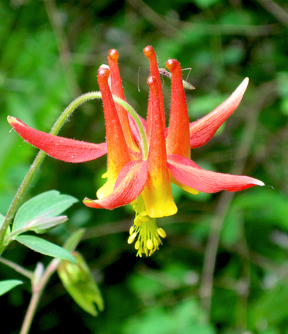
Who Cares?
But who cares? What does it matter?
Many things in life matter deeply, of course, including the life of words. I would ask: what “voice” stands behind this lonely lament? “Who” is speaking when someone cuts off the whole discussion with a dismissive toss of the hand, “who cares?”
The first note we hear in this remorseful voice is that of the lone, isolated ego, who has lost deep relationship with others and the land. To the ego, nothing matters anymore (except the ego).
The second thing to discern is the standpoint of the voice speaking—perhaps it’s the voice of an over-whelmed commuter too harried to focus on anything, or perhaps the bored, snarky voice of an adolescent distracted by digital toys, or perhaps that of an abstracted philosopher with his head in the heavens but feet not touching the earth, or perhaps a world-weary cynic (that disappointed moralist), or perhaps the voice of a transient merely passing through, or even the voice of a hustler who manipulates words to con people or sell his stuff.
To the first several voices, I respond, as the poet of Ish River, Robert Sund, once said, “If you don’t know where you are, then you don’t know what you’re doing.” To such folks, the real question becomes: When you’re lost, directionless or ungrounded, do you know how to find your way home again?
To the opportunist, I say: Words are real. If language speaks, then words matter and names call. Names matter: real names are the ones who call out to us as we respond in kind—they inspire and guide us, show us the way. To be true, names should be grounded in existence, hence, mean what they say, say what they do, do what they are.
To the hustler, I say: words and names are not arbitrary, to be used however one wishes, to manipulate appearance or deceive others. If you would hijack the good name of Cascadia, for instance, to sell stuff or push your party’s position, then you borrow its charisma for your own egoistic or narrow ends, and, thereby, depreciate its significance.
There are always opportunists, of course, seeking to capitalize on the latest currency, who cash in and move on, without a qualm—last year it was this, next year it will be that. Who cares when the coinage “loses its juice,” when they’ve “milked it dry” and discarded the old emblem as useless? “Whatever…”
But when you use words and names to obscure, con, or cover-up, when you depreciate the life of the currency, then you engage in the corruption of discourse and language, our shared world of meaning.
The latter voices are more dangerous than the former. They include the nominalist who claims that words are mere markers, and thus have no reality or 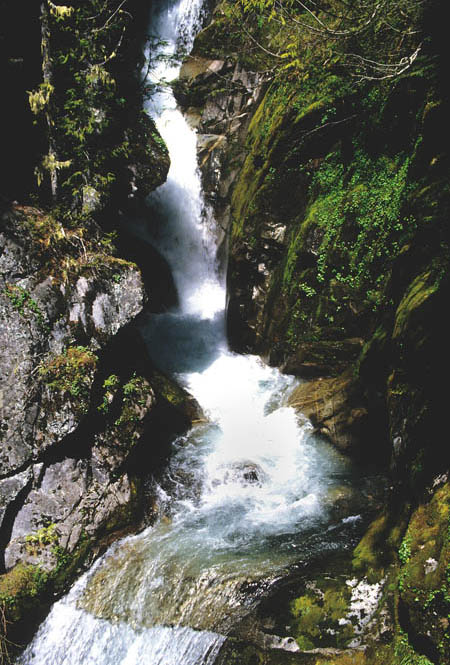 ground, and can be used “anyway I want.” They include the utilitarian who says language has only instrumental value (like any tool), and is merely “a means to an end.” ground, and can be used “anyway I want.” They include the utilitarian who says language has only instrumental value (like any tool), and is merely “a means to an end.”
Who cares, they maintain, as long as it works? (Of course, there’s the rub—it only works if people believe it; but when they no longer believe it—because of what you’ve done--you have to find a new hook). Note that the nominalist, cynic, utilitarian, sophist, hustler don’t make anything real--instead they empty out the world of meaning.
But, if we go along with the practice of words emptying meaning rather than filling life with significance, if we undermine rather than deepen communication, if we confuse or deceive or cover-up, then what does it matter?
Who cares? Why not call the place “X,Y, & Z,” or by its latitude/longitude coordinates, e.g. 140 by 60 degrees, or perhaps in the lexicon of the day, “version 3.2.7.”? Or, in global mercantile monoculture, why not use a barcode to brand our region? What the hell difference does it make anyway? We might just as well go “off-world,” as any of these tech-terms would do….
But I don’t believe any of the standpoints behind these “voices.” They are neither true nor fundamental. I do believe that where we are is essential to who we are, and “how” we exist here. I believe words are real—they ground us in the very structure of existence, and should speak the truth. And I believe we become the words we speak, are inspired and guided by true names which call us.
Meanwhile, another voice, a deeper, older voice, rises, asking: who are you people? What are you doing here? What “voice” speaks through you?
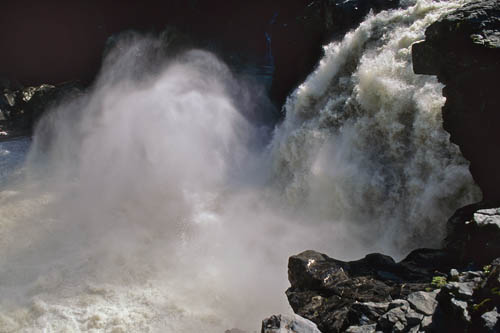
If you are “Cascadian,” presumably you act differently, informed by the spirit of this place.
The question of the name of our region, therefore, and who we are (or shall become) here, is crucial to our identity and purpose, as well as the destiny of life in this place. If we hope to become a people in this place, then we need to discover who we truly are here.
In a real sense, the sage of New England, Robert Frost, had it right in his poem, “The Gift Outright,” (and I paraphrase): “The land was ours, before we became the lands’.” Indeed, the land of Cascadia is our “gift outright.” And our task of “naming and claiming” is first to acknowledge the gift by “becoming hers.” Giving gifts, of course, establish relationship—to take without receiving and giving back, in turn, is to violate the very spirit which infuses the gift itself.
Rather than claiming the land, then, for control by distant interests or for the ego, when you find yourself falling in love with a place, you become claimed by it instead. You become not merely “in” but “of the place, with the place, for the place.” And you began to share the gift with others. The gift overflows like a cascade, always over-pouring, endlessly giving itself away.
In this shift from exploiter or mere resident to inhabitant, we may hope to become true dwellers in the land.
We are trying here to learn to “tell the story of this place, so we may find ourselves in that story.” We need to come home, to accept “the gift outright,” to learn to become inhabitants, come to terms with the places we live, and cultivate a culture of our true common ground in the lands we love.
Learning to Speak Her Name
And what better way to begin than by learning to speak her name?
In order to speak truly, to establish a respectful relationship, one must learn the appropriate terms of address. And to learn these, one must first learn to listen.
Let’s say, for example, her name sings a beautiful sound, something poetically round as an island, rolling off the tongue, like “Arianna.” But you stubbornly refuse to call her by her own name, persist in addressing her in more prosaic terms such as “Betty” or “Harriet.” She calls out “Arianna,” but you can only mutter, “Harriet”—its not hard to tell that relationship is going nowhere! And too often, that’s where we find ourselves--nowhere, without a clue….
Getting “clued in” involves paying attention, learning to listen to the sound the land itself calls out.
Why Cascadia? The land calls out her own name, if we would learn to listen. As water is the voice of this place, cascades sing their own song.
The word “Cascadia” (kas-kad’-e-a) is first heard as a beautiful rhythmic sound. You can hear water’s flow in the very shape and sound of the word itself—Cas-cad-i-a! The word tells us that it is spoken not in flat monotone, but rather in a rolling rhythm rising and falling in a intonated cadence, “Cas-cad-i-a.”
Listen as it flows, rolls trippingly off the tongue, streaming its own rising and falling rhythm. Cascadia sings out what it does--a word alive as our rivers.
Cascadia is the song mountains sing to their rivers. Cascadia, then, is the musical signature of the place. Cascadia--the word itself flows, rolls, tumbles and falls, breaks into white water song. It calls out to us in the song it sings….
Further, Cascadia is a word euphonious and round with a sound-ending “ia”—meaning “land of…”, a pleasing parallel to California, Columbia, and so on.
And in terms of its root meanings—the French “cascade” from the beautiful Italian word “cascata,” derived from the Latin word “cascare,” past-participle of the Latin verb root, “cadere”—to fall, it’s clear that etymologically speaking, our word “cascade” rises from an ur-spruung rich in its own meanings. If “words tell stories”, then “cas-cadere” has its own great story to tell.
Cascadia is a fine word for many reasons, but as a name for our region it rises from a deeper place of significance. If “A place is a story that happens many times,” as Kim Stafford reminds us, then we need to dig deeper to discover what story Cascadia herself tells.
Learning her name, calling back to her with the same song she calls out to us, means learning to listen to the land itself. For Cascadia is a name that sings itself in what it does….
Coming later:
2. What Cascades Do
3. How Cascadia Got Its Name
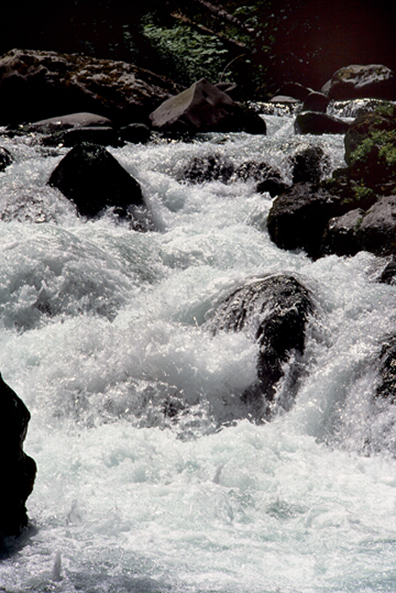
home page |